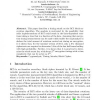Free Online Productivity Tools
i2Speak
i2Symbol
i2OCR
iTex2Img
iWeb2Print
iWeb2Shot
i2Type
iPdf2Split
iPdf2Merge
i2Bopomofo
i2Arabic
i2Style
i2Image
i2PDF
iLatex2Rtf
Sci2ools
114
click to vote
SACRYPT
1998
Springer
1998
Springer
A Timing Attack on RC5
Abstract. This paper describes a timing attack on the RC5 block encryption algorithm. The analysis is motivated by the possibility that some implementations of RC5 could result in the data-dependent rotations taking a time that is a function of the data. Assuming that encryption timing measurements can be made which enable the cryptanalyst to deduce the total amount of rotations carried out during an encryption, it is shown that, for the nominal version of RC5, only a few thousand ciphertexts are required to determine 5 bits of the last half-round subkey with high probability. Further, it is shown that it is practical to determine the whole secret key with about 220 encryption timings with a time complexity that can be as low as 228 .
Block Encryption Algorithm | Cryptology | Encryption Timing Measurements | Encryption Timings | SACRYPT 1998 |
Related Content
| Added | 06 Aug 2010 |
| Updated | 06 Aug 2010 |
| Type | Conference |
| Year | 1998 |
| Where | SACRYPT |
| Authors | Helena Handschuh, Howard M. Heys |
Comments (0)

